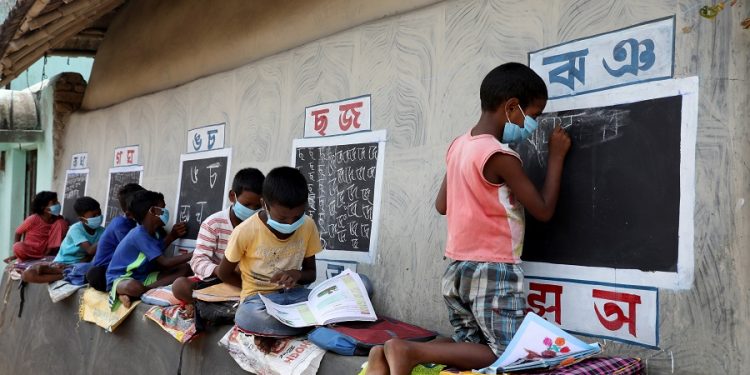The world is battling a deadly virus that refuses to go away. War and brutality have returned to Europe, thanks to an unhinged tyrant in the Kremlin. And climate-related disasters – floods, fires, extreme storms, and droughts – are occurring with greater frequency and intensity than ever in developed and developing countries alike.
But the world is not completely without sources of inspiration and optimism. All it takes to appreciate this is a trip to Barandanga, a village adjacent to the small town of Para in the Purulia district of West Bengal. My aim during a recent four-day visit to the region was to study new initiatives to provide education, and particularly creative education, to the rural poor. But I gained much more. Largely cut off from the rest of the world with no newspapers or television, and visiting schools in one village after another, I felt a wonderful sense of hope.
This remote corner of West Bengal, bordering the state of Jharkhand, is largely tribal land. Tribes and clans such as the Santals, Shabars, and Murmus arrived here from Africa thousands of years before the so-called Aryan invasion, which began a little over 3,500 years ago. These tribal people are often illiterate and very poor.
As I drove to Para, I passed through vast stretches of undulating, largely uninhabited terrain punctuated with clusters of homes. The scenery looked like a cross between the American prairies and the nineteenth-century rural Britain described by the Brontë sisters. I had come to visit Nanritam, a voluntary welfare organisation that initially had little to do with education. The two women who founded Nanritam in 2002 – Ranjana Sengupta, an IT professional, and Bharati Bakshi, a doctor – were troubled by the widespread incidence in the region of eye disease and blindness that could be easily corrected with modern medicine. So, they founded an eye hospital in the middle of this poverty-stricken area.
Through a combination of missionary zeal and entrepreneurial savvy, the women soon had a modern hospital with a state-of-the-art operating theater. Excellent doctors, many of them volunteering for short stints, performed cataract and retinal surgery and treated people for glaucoma. Many of the patients brought in by vans from villages far and wide had never been to a hospital before.
There was a Maoist insurgency in the area at the time. But, as people regained the gift of sight and Nanritam’s reputation spread, the revolutionaries left the organisation alone. Some of them even quietly slipped into the hospital to get their eyes tested. (After a one-day visit in 2012, I agreed to serve as a mentor and joined Nanritam’s executive committee).
Nanritam also wanted to provide the region’s children with a modern education, and later established the school in Barandanga that I visited on my recent trip. The students learn their mother tongue, usually Santal or Bengali, but the medium of instruction is English – the idea being that this will help them find a job anywhere in the world. They learn mathematics and poetry, physics and computing. The school believes that routine work is going to disappear in the future, and that children will therefore need creative skill.
Chatting with the students left me spellbound. They were talkative and full of fun, and the creativity of some of their mathematics and geometry exercises was comparable to what one sees in advanced economies. The first cohort of students completing grade ten will graduate next year.
The rapid adoption of new digital technology triggered by the COVID-19 pandemic drove home to Nanritam’s managers the need for creative education rather than old-fashioned rote learning. So, in 2021, in the midst of the pandemic, Nanritam started the Education for All programme to spread creative learning to neighbouring villages and districts. The organisation regularly brought in teachers from other schools to conduct in-person or virtual training, and provided books for children in 150 schools in the region. It is now able to reach 40,000 students, including the poorest of the poor. This is a large number, but still small relative to India’s population.
Moreover, as a striking 2005 paper by the economist Michael Kremer and his co-authors showed, teacher apathy and absenteeism is a major problem in India. Given this, the quality of the schools I visited came as a pleasant surprise. One of the most impressive was the Marang Buru Chacho Marshall School, which is nothing but a cluster of huts in Susunia Hill where Santal children live and receive an elementary education. The school is run by Lakshmi and Babunath Tudu, a Santal tribal couple. Babunath grew up in extreme poverty, at times eating only on alternate days. His parents had to choose which child to send to school, while the others worked to ensure the family’s survival. It was magical to see how much the right mix of inspiration, empathy, and commitment can achieve. Economists typically advocate reducing teacher absenteeism through financial incentives – giving teachers an extra reward if they make it to their classes (that is, if they do what they are supposed to do) or cutting their pay if they do not.
But money does not determine all of our aims in life, many of which are “created targets” that reflect the fact we have a choice of goals. People who take pride in what they do work hard. People who develop the instinct to be helpful reach out to others and teach better. We pay too little attention to these larger dimensions of the human mind and human motivations.
What I am describing may seem overly reflective of the warm glow of my recent experience. But the glow can be long-lasting, which makes me believe it can also be far-reaching. If we think creatively and provide children, including the poor and the marginalised, with an innovative, quality education, we can make a big, cost-effective change for the better in the lives of the poorest among us.
The writer, a former Chief Economist of the World Bank and Chief Economic Adviser to the Government of India, is Professor of Economics at Cornell University. ©Project Syndicate.






































